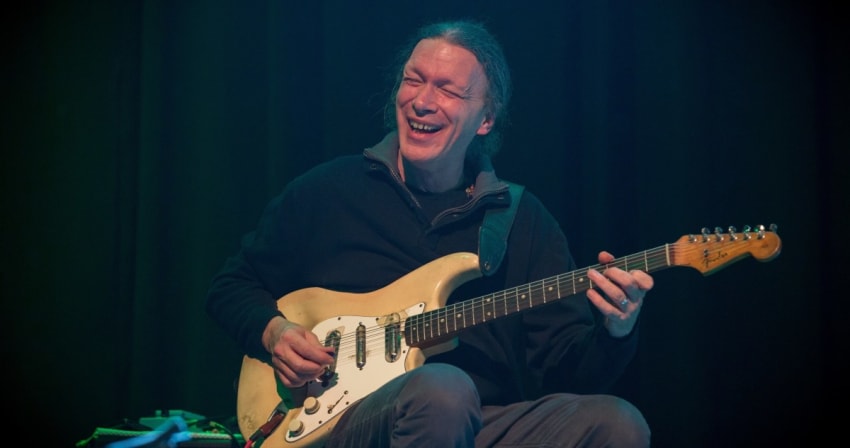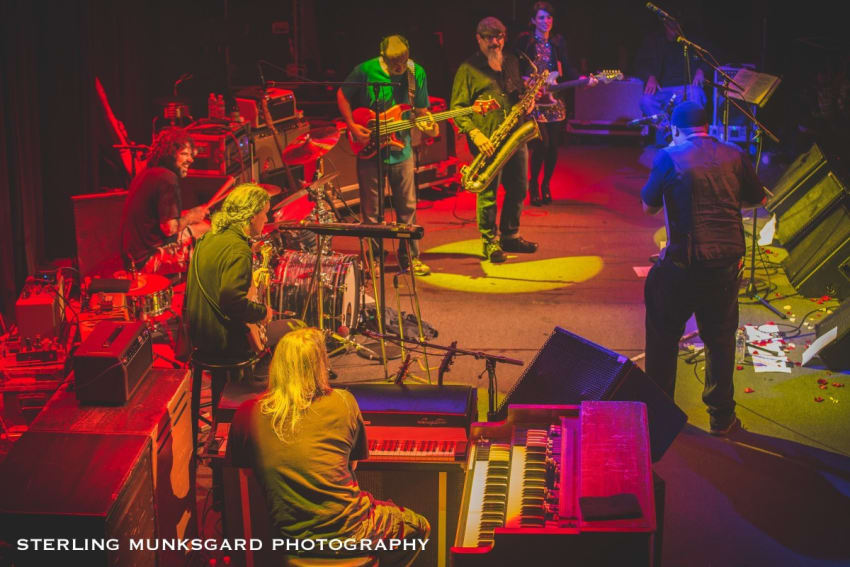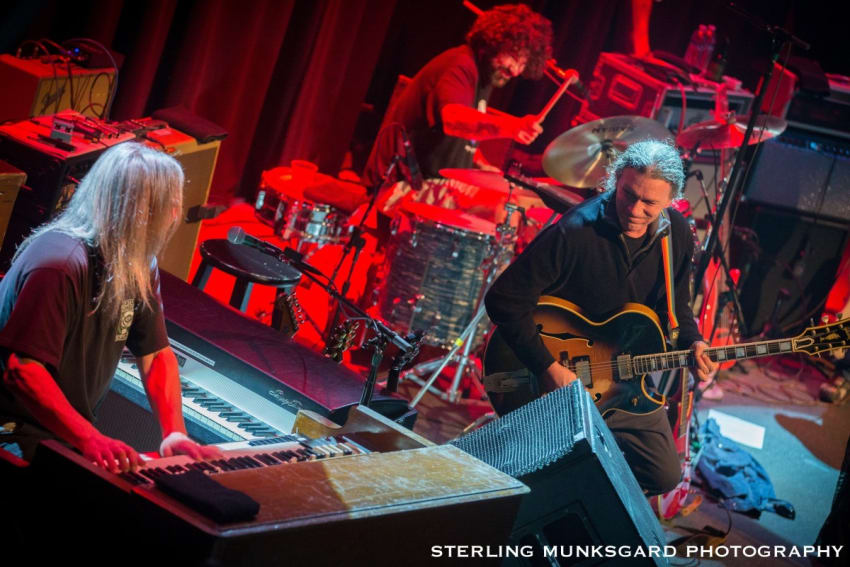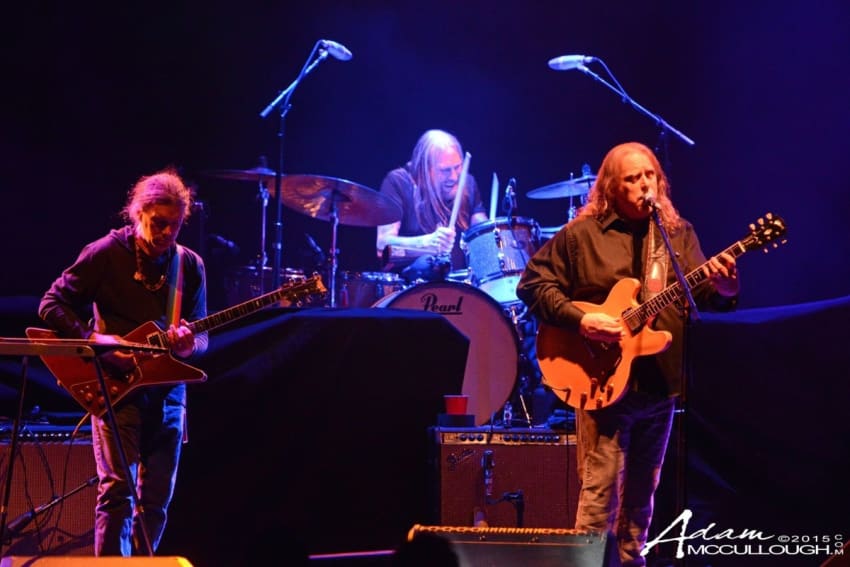Interview: Steve Kimock On His New Album, New Band & New Musical Pursuits
By Chad Berndtson Feb 24, 2016 • 12:49 pm PST
Words by: Chad Berndston
“Sage.” “Wizard.” “Virtuoso.” “Monk.”
These would be words of high praise and interesting association for anyone, but where guitarist Steve Kimock‘s concerned, they’re pretty much par for the course.
Kimock’s been wowing audiences for so long now with his cerebral, yet highly soulful style that it’s tough to consider what he hasn’t done. In the situations and ensembles he’s been part of for the past year alone — let alone a career that spans more than 40 years — you could have heard him shred electric, or tease out mystical-sounding chords on a range of steel and Hawaiian guitars, or offer up somewhat haunting, gently yielding, but never brittle tones that sound something like a night sky looks.
He’s spent a lot of time over the past few years in the Grateful Dead idiom, particularly with RatDog and also with a boogie-heavy Steve Kimock & Friends group focused on Dead and Jerry Garcia staples. But he’s never been one to pin down, and Kimock’s latest album, Last Danger of Frost (out March 18), is perhaps his post un-pin-down-able album yet.
Flush with a range of sonic textures, from coarse electronics to spectral acoustics, it’s an experimental effort, no doubt. One track is a construct of tones yielded from guitar feedback. But this is not Kimock’s Metal Machine Music — far from it. It sounds like a 60-year-old guitar wizard sounding ever more defiantly like himself. And what’s more, he has a new band, K I M O C K, at the ready to serve this left-of-center creativity: his oldest son, John Morgan Kimock, back from a stint with Mike Gordon to play drums, old pal Bobby Vega on bass, and upstart Leslie Mendelson on vocals.
Kimock turned the big six-zero in October, and is at a time in life, he notes, where many of his longtime compadres and musical colleagues have passed on.
As he and the band gear up for a lengthy tour, he updated JamBase on what’s to come.
JAMBASE: So what is K I M O C K about? Tell me what this band is and how you arrived at this lineup.
Steve Kimock: That’s a good one. At the core of the idea … well, I was just trying to play some stuff that I would consider a personal part of my trip, musically. It isn’t stuff that makes it onto the stage so much as part of the standard lead guitar, featured soloist in a band role. Some of it is a bunch of acoustic music I’ve always enjoyed. I love playing acoustic, and Hawaiian guitars, and fretless guitars at home. Most of the last 20 years especially while I was busy working on the electric, fretted guitar playing rock ‘n’ roll, at home I was being very modal, and Appalachian, and possibly Northern Indian, on the acoustic guitar. It has a lot to do with where you feel like home is and what you can do in the employment of the instrument.
So the idea was stuff that I was just enjoying: guitar, and also a sound design aspect using synthesizer, certain instruments and sampling. There’s more electronic stuff in the music, and more acoustic stuff in the music. From there I recorded, and it was big enough and interesting enough where it occurred to me, why not just stick the whole concept out there as a thing?
So what would be different about this [from previous Steve Kimock releases], first of all, is in the production, second of all, is enough that I can use an acoustic guitar where I want. For a while, you know, I traveled with an acoustic guitar and if I got into a room that seemed like a good listening space and where the audience had the right attitude, I’d play some acoustic. I didn’t push it that hard, but I wanted there to be room for that beyond the yelling-at-you rock ‘n’ roll stuff.
What you’d expect to be kind of the same for me is that this is still part of my whole trip on the guitar. My style is kind of lyrical and improvisational and kind of errs on the instrumental side, but also on the side of ensemble chemistry and what you can get with a band. I couldn’t ask for a better chemistry than I have with Johnny or with Bobby Vega. And Leslie and I have such a fondness for a left-of-center kind of pop thing. This trip is not devoid of song.
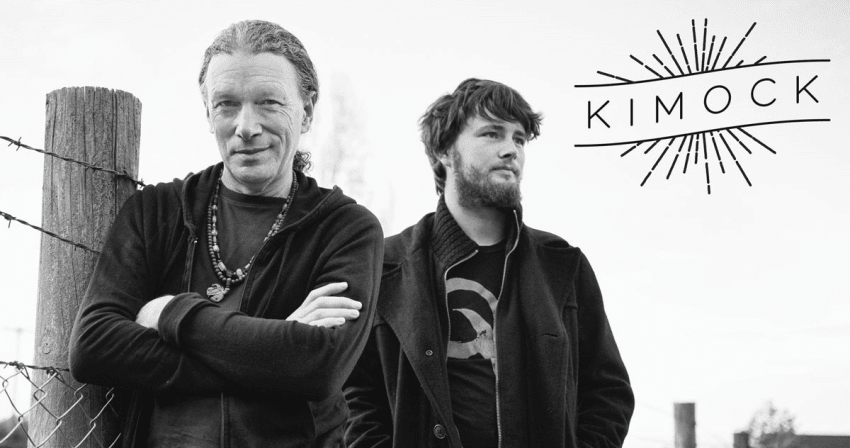
JAMBASE: Given all your potential collaborators, though, how did you arrive at this particular foursome?
SK: In this case it’s the willingness of the people involved to work real hard on it: put in a lot of time, a lot of work together on a lot of very different stuff. The level of enthusiasm they have to roll up their sleeves and make it go is really neat — to be at this intersection here, together.
Johnny and Bobby and I have been on this trajectory for, I would say, a long time. So it was, “hey man, wouldn’t it be neat if we could just do something in service of this creativity and not have it be this format or that format?” This has been coming for a while — it’s not like I went out and grabbed a bunch of random guys and sprung a bunch of stuff on them to play with me. Part of it’s just thinking about the future, and what you’d like to do with your music and what’s possible and arriving at one of those intersections where everyone’s like, oh, this is a lot of work, but let’s do it.
JAMBASE: You’ve been playing with John professionally for a while now. He’s your son, of course, but did you have a natural musical rapport with him? Or was that something that developed over time?
SK: Yeah, I did. With him I started out, like moment one, I bonded with the dude, you know what I mean? He’s my oldest son, my firstborn — that’s a pretty profound thing for me. If you have kids, you know that feeling of just being filled with love. I was not like, practice this, or do this without fail, or slapping his wrist if he didn’t do something right. There was never any of that, I just encouraged him.
I knew really early on he was on to something — something that deserved respect and attention — so I gave him all the support I could without directing him any way or holding his hand. It’s funny: he might have been 2 years old, and he would take stuff, like a little toy drum, and a book, and a bowl and some other objects, and he’d arrange them in a semi-circle around himself, and then he’d play on them with sticks. He had this knack for navigating spaces that he’d composed. He really was like that right away — had an unusual intuition about things.
My musical rapport with Bobby Vega has been going on since quite some time before that. And Bobby and Johnny actually hooked up real early in Johnny’s musical life. It’s neat that it’s gotten to this point, with his musicianship and his attitude and his maturity. He’s playing some pretty intense gigs these days. He’s in Mike Gordon’s band, you probably know.
JAMBASE: I did know that! He’s been well-received.
SK: It’s such a thrill. I went and saw them at The Fillmore. Even if it wasn’t my kid — and I can hardly call Johnny a kid now — I’d go, awe man, I want to play with that guy.
JAMBASE: So this band will be your priority this year.
SK: Oh yeah. I’m going to get to do a whole bunch more of this. I’d like to record with this group more right away, and we’re working on music now. I’ll still make time to do straight-up electric blues and rock ‘n’ roll stuff and do situations that present themselves. I’ve done a lot of that for so long, though, so let’s do some more music. I’m trying to keep myself fresh. I’m in the fourth quarter.
JAMBASE: Come on, it’s not the fourth quarter.
SK: [laughs] I’m 60, man. It’s the fourth quarter. There might be five seconds left on the clock.
JAMBASE: If I’m not mistaken, you are back based in California?
SK: I am. I spent 13 years in Pennsylvania, doing the family thing. There was enough to pull me back out here. It was sort of enough-is-enough with that East Coast winter and so forth, so I’ll give it another shot. I grew up in Pennsylvania. I moved to the Bay Area — Marin County and Fairfax — which was as much a culture shock as you could handle coming from a field town in Pennsylvania. I was there from the middle 70s to about 2000 or so, so a good long time.
JAMBASE: Can’t argue about the weather.
SK: I’m sitting outside today — it’s a beautiful day and it’s exactly why I wanted to come back. The other thing is, I have an 8-year-old and a 12-year-old, and they were in very good schools in Pennsylvania, academically. The social and community aspects there, though, I didn’t think it was quite as like-minded for them as they could find out here. You make moves for your family.
JAMBASE: Let’s touch on some of your other recent projects. This version of Steve Kimock & Friends and the music of the Dead and Garcia — this seemed like a lot of fun for you.
SK: Oh man. Yes. I got into it more as it went along and it got to be pretty much like I wanted it to. It was cool, I really enjoyed it.
JAMBASE: Think you’ll keep doing it?
SK: Yeah, although I don’t know when. Those guys are all dear friends of mine — I love those guys. Jeff Chimenti, are you kidding me? Fucking monster. I love playing with him. All of them, and it’s a great hang and all that. There’s no doubt you’ll find me in that format again in whatever incarnation of reincarnation it happens to be.
That music’s there. I’m a San Francisco musician. Like Bobby Vega always says, if you go into a room full of people with a cold, you catch a cold. If you go into a room full of people playing East Bay funk, you catch that, too. The whole soup all of those guys grew up playing in, I know that soup, and I don’t have any problem going back to that soup again and again. I respect that music and that tradition as a unique thing. There aren’t a lot of those psychedelic guitar players left from that. I’m not going to do it every day. I’m not going to eat off that table exclusively, but I do go back to it.
JAMBASE: Speaking of that whole soup, is RatDog returning any time soon?
SK: Oh, I’m not the RatDog spokesman. I would not pretend to speak for it. That would be [Bob] Weir’s thing. You never know with that guy. He may at some point feel like walking the ‘Dog again. It’ll be there, and if I’m lucky enough to get in there for that, I’ll get in there for that. I have no knowledge of specific plans. But we stay in touch, he comes down to sit in with me whenever I’m in town and all that. I love the guy. I’ve always had a real blast playing guitars with him and watching him in a bandleader role, I think he’s great at it.
JAMBASE: Has Weir changed much since you’ve known him?
SK: I’ve known him for a long time, man, everybody’s changed. But has he changed much … [long pause] … no, not really. I think he’s always had this gravity about him, and that’s just gotten greater over time. The guy is solid, you know? Especially as a musician, in a way that’s difficult to describe. In terms of his approach or artistic trajectory, I don’t think you would describe that as wholly different now than before.
JAMBASE: If I can bend your ear on a few more things that always come up, any talk of more Zero reunions?
SK: No, not now. We’re always threatening it, though, and threatening to crack another batch of material. People do ask me occasionally, how about some Zero gigs? Well, hey, half the band is dead, so what can be done?
Zero got to a point, sort of as a gang. We had such a gang of people: Judge Murphy, John Cippolina, Martin [Fierro], Nicky Hopkins was in that band a bit, John Kahn. All of the people who made that band happen, who would do that band that way, there are not that many of those guys left. It’s difficult to pull the chemistry back together in a band like that with puzzle pieces missing. But we’ll keep finding excuses to trot something like that out there. Zero was a great band, for sure.
JAMBASE: Wanted to also ask you about one more recent gig: your sit-ins with the Mule over New Year’s. How was that experience?
SK: Gov’t Mule at the Beacon Theater in New York, on New Year’s Eve — I mean, who wouldn’t want to do that? It was a riot. It was a whole lot of fun. It was another one of those gigs where everyone who was coming in to play with the band, the folks I didn’t know, they were all like, hey man, I did a gig with your son. “Oh, that guy’s Johnny’s dad.” [laughs] That always feels good.
Warren [Haynes] and I go way back. He’s like superman or something like that. I don’t know anyone who’s got the energy he does to keep it all going at the level he keeps it going. It’s inspirational. It would be one thing if he was just a great player or a singer or songwriter and had a good band here or there, but he works his ass off to get all that stuff happening. We have a lot of respect for each other’s playing and have for a long time.
Loading tour dates

